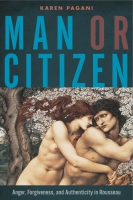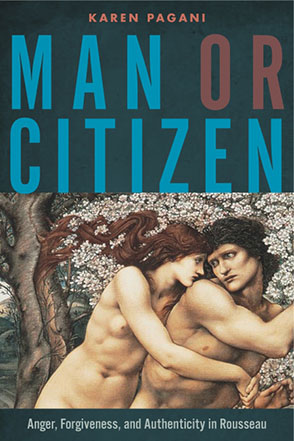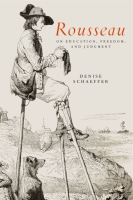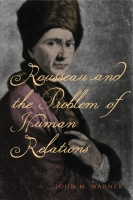Man or Citizen
Anger, Forgiveness, and Authenticity in Rousseau
Karen Pagani
“This intelligent, original, and thought-provoking study offers a fresh understanding of Rousseau’s moral and political philosophy from the specific angle of forgiveness.”
- Description
- Reviews
- Bio
- Table of Contents
- Sample Chapters
- Subjects
“This intelligent, original, and thought-provoking study offers a fresh understanding of Rousseau’s moral and political philosophy from the specific angle of forgiveness.”
“A lucid, illuminating contribution to research on the history of modern attitudes towards sentiment and emotion.”
“While Rousseau’s conception of natural pity has been the focus of numerous studies attending to issues in his social and political thought, neither anger nor forgiveness has been explored in any great depth. Man or Citizen engages with all the important primary and secondary sources and moves nicely between fiction, autobiography, and social and political texts.”
“A well-researched and clearly written study, of interest to scholars of Rousseau, political theory, philosophy, and literature.”
Karen Pagani is Assistant Professor of French and Italian at the University of Texas at Austin.
Contents
Introduction
Part I. The Political Significance of Forgiveness and Anger in Rousseau’s Thought: The Dialogues as a Case Study
Chapter 1. The Magnanimous Pardon: A Force to be Reckoned With
Chapter 2. The Philosophes’ Plot and the Frenchman’s Anger
Chapter 3. The Productive Capacities of the Citizen’s Anger
Chapter 4. The Frenchman’s Conundrum
Part II. Private, Interpersonal Forgiveness: The Rousseauvean Intervention
Chapter 5. The Confessions: Saint-Lambert and Rousseau’s Miraculous Reconciliation
Chapter 6. Publicized Anger and the Unforgivable: Reconsidering the Story of the Foundling Hospital
Chapter 7. Forgiveness Among Men and Citizens in Julie
Chapter 8. Émile and Sophie: To forgive or not forgive? That is the Question
Conclusion. Forgiveness Today and Rousseau’s Legacy
Bibliography
Introduction
From Achilles’ rage and the banishment of Prometheus anger has long been more than simply a private emotion. Western philosophy has a long tradition of considering the social meanings of anger and its various resolutions, be they in the form of forgiveness, punishment, or some sort of retribution. Yet it is only recently that we have begun to see scholarly studies that contrast these sentiments and actions from antiquity and early Christianity with those from more recent debates. These studies illustrate just how dramatically the concepts of forgiveness, punishment, and retribution have evolved over time.
The contributions of Donald W. Shriver Jr. and David Konstan are exemplary. Though addressing two very different literary and cultural traditions (Shriver’s focus is early Christianity while Konstan’s is ancient Greece and Rome), both authors convincingly illuminate the connection that existed between forgiveness, pragmatism, and politics throughout antiquity. They point to the lack of concern for the emotions of the agents involved in these early discussions of conciliatory action. This observation leads both to conclude that the meaning of forgiveness and, we may presume, of anger has undergone drastic revision. Konstan, for example, posits that a more emotive variety of forgiveness probably emerged in the late eighteenth or early nineteenth century, though he makes only the barest of assertions as to how or why this may have been the case. If Konstan is correct, then we are left to ponder, first, when the modern idea of forgiveness appeared and, second, how and why it came into existence.
There is, to be sure, no shortage of theological studies addressing the evolution of the meaning and significance of forgiveness within various religious traditions. Much work has already been done by philosophers and political theorists addressing the question as to what forgiveness can and should mean within secular ethics, and what role (if any) it should have in politics. Yet there are still few scholarly studies addressing how the secular meanings of anger and its various antidotes have evolved throughout modernity.
The following study is intended as a contribution to filling this void. In the philosophy of Jean-Jacques Rousseau we see anger portrayed—for the first time by a major philosophical figure—not only as an inevitable outcome of social intercourse but also as a definitive aspect of his own identity. Moreover, Rousseau situated the problem of anger and its various resolutions at the very heart of modern subjectivity, a characteristic of his approach to ethics that sets it apart from those of his contemporaries. Rousseau is important therefore for anyone who wishes to better understand how modern conceptions of conciliatory action came to be, especially when one considers how central he was to establishing both sincerity and authenticity as moral values.
What follows is a reconstruction and critical analysis of the meaning and significance of anger and its most potent corrective, forgiveness, within Rousseau’s philosophical system. My aim is, first, to situate the different types of conciliatory action and sentiment portrayed in Rousseau’s corpus within the multifaceted network of sentiments that have in his view both moral and political relevance. Second, I will elucidate how different varieties of anger (indignation, rage, cool disdain, etc.) and the varied modes according to which they may be resolved figure in his project for social reform and his moral philosophy more generally, particularly where civic virtue is concerned. Finally, I will explore the degree to which an individual’s encounter with conflict may contribute to, ratify, and/or complicate an individual’s experience of subjective identity. To do so, I shall examine how the way an individual processes, expresses, and, most importantly, eventually resolves feelings of anger constitutes a decision about the moral categories one invokes when deliberating the way one responds toward the perpetrator of a wrong. Rousseau’s ideas about various forms of anger, resentment, indignation, complaint, and cool disdain and their correctives serve to further underscore the distinction between public and private in the figure of the republican subject within his thought. By this I mean that these responses to slight reveal the extent to which an individual either chooses to act (and feel) in accordance with civic virtue or, alternately, to adhere to individualized moral imperatives that are rooted more firmly in sentiment, personal predilections, and the demands of conscience, as Rousseau understood it.
I stress at the outset that it is not my objective to sketch a transhistorical, secular account of forgiveness. Further, I do not mean to suggest that Rousseau’s views on the subject could fulfill such a role. However, Rousseau’s thoughts can help us to articulate both the problems and potential inherent in defining forgiveness as a modern moral secular ideal, particularly given the centrality of anger to both his person and philosophical system. For this reason Rousseau is an important transitional figure in the ways that forgiveness and anger have come to be understood in the modern period.
Much of the impetus behind this work stems from the observation that Rousseau’s thoughts on both anger and forgiveness were deeply influenced by the very important distinction between man and citizen that underpins his political philosophy, and the radically different ethical imperatives regarding how one could and should respond to conflict that resulted on account of it. My task here is to outline what precisely these ethical imperatives consisted in for Rousseau and, in turn, to interrogate the philosophical suppositions upon which they were based. I hope thereby to shed new light on Rousseau’s conceptions of sociability and personal identity.
This particular study challenges the view that anger and misguided amour-propre are always inextricably linked within Rousseau’s system. Allan Bloom has observed that, “Anger is allied with and has its origin in amour-propre. Once it is activated, it finds intention and responsibility everywhere …It moralizes the universe in the service of amour-propre.” Whereas there are numerous examples in Rousseau where this is indeed so, there are just as many instances where anger is portrayed as a self-sacrificial and even quasi-divine quality of which only the most righteous are capable. This becomes clearer when one considers the distinctions that Rousseau makes between emotions and actions, such as anger, rage, indignation, hatred, complaint, and cool disdain, in the stories and scenarios he recounts.
One of the challenges in dealing with Rousseau’s treatment of these concepts is that he often ascribes the French word “colère” as well as “mépris,” “dédain” or “haine” to all of these experiences, even as he goes to great lengths to distinguish between them both conceptually and qualitatively. Part of my task, therefore, must be to distinguish between the various instantiations of anger we find throughout his work and the motivations behind them. In this study, “anger” shall simply denote the feelings of displeasure or pain that one experiences in response to either real or imagined malfeasance. One of my goals is to use terms that are more precise and readily comprehensible for the emotions that Rousseau describes, such as “indignation,” “resentment,” “rage,” and the like. This will make it possible to analyze more precisely the moral attributes and flaws they designate.
Rousseau’s tendency to privilege certain varieties and articulations of anger over others makes his approach to conciliatory action particularly novel compared with the discussions of his contemporaries and immediate intellectual predecessors, particularly Francis Bacon, Thomas Hobbes, Joseph Butler, and Denis Diderot. For Rousseau anger in response to slight was not necessarily something that always needed to be kept in check out of fear and the desire for peace. Rather, when properly reflected upon and calibrated, anger was a potentially enlightening experience that could provoke further reflection as to how one viewed oneself in relation to the moral law and to civic virtue. Accordingly, the experience of anger reveals the extent to which one’s allegiance to the law and/or what passes for civic virtue is revealed to be merely performative or wholly sincere. As my discussion of the Christian in Chapter 3 illustrates, those who are incapable—for whatever reason—of experiencing principled anger are not considered moral subjects under the rubric of Rousseau’s system, and cannot be considered either virtuous citizens or ethical individuals.
The analysis that follows is intended to be a development of two recent investigations of the meaning of both anger and forgiveness within Rousseau’s philosophy, those of Jeremiah Alberg and Patrick Coleman. I shall also consider Rousseau’s views on anger and reconciliation in relation to a second line of inquiry that addresses his thoughts on subjectivity and the radically dissimilar psychological experiences of the individual-acting-as-such and that of the citizen qua citizen that underpin his philosophical system. At least since Judith Shklar’s seminal work, Men and Citizens: A Study of Rousseau’s Social Theory (1969), these experiences have been central to analyses of Rousseau’s ethical system.
Rousseau is popularly and correctly seen as an avatar of inner authenticity, and this directed his views on how forgiveness could be exchanged within the intimate realm. As I suggest in my Conclusion, it is for this reason that he can largely be credited with having established the framework within which many contemporary accounts of private, interpersonal forgiveness operate. Yet, we also find within his corpus many discussions of how conciliatory action can and must display itself as a public good. My analysis is therefore complementary to the efforts of scholars such as Konstan and Shriver, who have attempted to chart the origins of the modern ideal of forgiveness, both within the private interpersonal and the political realms and, in the case of Shriver, within both religious and secular contexts. Like them, I too believe that the secular ideal of forgiveness is a product of history, and that it cannot be interpreted independently of this history. Whereas much scholarly attention has already been devoted to the concept’s development within a religious and specifically Christian context, there is still much to be done to uncover the attempts that were made in the early modern period to construct a wholly secular model of forgiveness. One of my aims in this study is to demonstrate how seminal Rousseau’s contributions were to the construction of the secular understandings of forgiveness that dominate today in both political and philosophical discourse. In particular, I want to elucidate the degree to which he paved the way for the now popular conception that there are indeed two fundamentally distinct varieties of forgiveness: namely, an emotive variety applicable within private, interpersonal relationships, and a fundamentally political one that seeks its ratification within the public realm.
Rousseau was, if not the first, certainly the most vocal advocate of the view that those deliberating the appropriateness of anger in the face of conflict and the possibility of forgiveness must, in certain contexts, take into account their emotional orientation vis-à-vis their malefactor, while in other cases must bracket such emotional attachments. He therefore set the stage for what is now a prevailing tendency among those who have attempted to define forgiveness to distinguish between private, interpersonal forgiveness and political reconciliation. On account of his political and moral theory, Rousseau began a new approach to conciliatory action: how individuals experience, process, express, and eventually resolve the pain they suffer in response to malfeasance is regarded as highly dependent upon, first, the relationship that individuals have with their malefactor prior to the misdeed and, second, on whether or not they conceive of the misdeed as threatening their identity and, more specifically, their status as an autonomous individual or as a virtuous citizen. I will deal with both of these models in their turn, contextualizing them within the historical and philosophical situations from which they emerged.
Forgiveness, Anger, and the Ethic of Authenticity
That Rousseau would be integral to an evolution in modern, secular approaches to forgiveness is not entirely surprising, perhaps particularly to those who have explored private, interpersonal forgiveness and who propound the more emotive variety. A common attribute of many contemporary accounts of forgiveness is that there is typically a large (and, depending on one’s theoretical allegiances, inordinate) amount of attention paid to the agent’s experience of the action when deciding whether or not a specific instance of forgiveness may be considered ‘genuine,’ ‘authentic’ or, to use Charles Griswold’s term, “paradigmatic.” The consensus has often been that, in order for forgiveness to be considered genuine in the private, interpersonal sphere, it must be produced by the autonomous subject and with consideration for the individuated distinctness of the individual upon whom it is bestowed. It must not simply be performed by the agent, but must also in some sense be felt. Vladimir Jankélévitch’s, Le Pardon (1967), is a prime example of this. Derrida’s account of forgiveness in “Le Siècle et le pardon” (1999) is yet another. Charles Griswold’s study, Forgiveness: A Philosophical Exploration (1999), is a case in point, as is the exchange between Jeffrie Murphy and Jean Hampton in Forgiveness and Mercy (1988). With certain qualifications, the same could be said of Arendt’s understanding of the concept in The Human Condition (1958).
What these otherwise disparate accounts all share is that they cast forgiveness as an “eminently personal experience,” to use Arendt’s words, and in so doing insist that forgiveness must entail a re-orientation of agents vis-à-vis their malefactor at the emotive level. All of these accounts are thus deeply concerned with what could arguably be considered the aesthetic attributes of the action (i.e. how it is perceived, narrated, and esteemed by the agent) more so than with the actual effects it may have in the world. These accounts of forgiveness all rely, to a surprising extent, upon the ethic of authenticity that pervades our age, one that instructs us that we are not obliged to locate our true self (or, for that matter, our most self-revelatory actions) at the point where action and principles fully coincide. Proof of this is the fact that all of the aforementioned thinkers describe forgiveness in terms that are hostile to impersonality, reason, calculation, and, in many cases, even duty. And although many of these thinkers tend to consciously resist resorting to moral subjectivism in their descriptions of moral impulses more generally, their accounts of forgiveness would nevertheless be incomprehensible without a subject-centered value system that has more or less been generalized within the Western tradition, one that accords a great deal of credence to the predilections and emotional states of the individual. Their great methodological and ideological differences notwithstanding, in constructing their accounts of forgiveness all of these thinkers rely heavily upon the belief that the wholly psychological I-ness of personality and the emotional state of the agent possess a certain amount of social, cultural, and ethical currency.
But such an ethic of authenticity did not begin to pass into common parlance until the end of the eighteenth century. This was in large part due to Rousseau. He was, if not the first, certainly the most vehement advocate of the view that moral salvation consists in recuperating authentic moral contact with oneself by means of interrogating one’s desires, emotions, and moral failings with excruciating candor. Charles Taylor aptly describes Rousseau’s contribution to the experience of modern identity as follows: “Rousseau is at the origin point of a great deal of contemporary culture, of the philosophies of self-exploration, as well as of the creeds which make self-determining freedom the key to virtue. He is the starting point of a transformation in modern culture towards a deeper inwardness and a radical autonomy.”
Though it has often been overlooked by those who have interrogated the history of forgiveness as a secular ideal, the rigorous assessment of an agent’s own feelings—of anger, fear, rancor, and of residual love and affection—toward the perpetrator of a misdeed as a means of determining both if forgiveness should be granted and when bestowals of it are felicitous is inconceivable apart from such a development. Accordingly, if we wish to chart the development of the concept of forgiveness in the history of ideas, Rousseau’s contributions cannot be ignored. After all, he was the most notorious early modern intellectual to champion the now widespread belief that, in determining the significance of private, interpersonal relationships, one must adopt a nonrepressive attitude toward one’s emotions and inner nature. This obliged Rousseau to espouse the position that the continuation of such relationships in the wake of misdeeds must not be regarded as a duty that is imposed by exterior demands of authority, tradition, pragmatism, utility, and/or bienséance if these relationships are to be considered both sincere and authentic. For this reason alone we do well to seek out a precursor to contemporary accounts of forgiveness of the private, interpersonal variety in Rousseau’s works.
But Rousseau’s significance for more recent discussions concerning the meaning and value of forgiveness does not end there. His social and political theory, as well as his literary and autobiographical works, reveal that he was also deeply concerned with how anger functioned, how it could be resolved, and, when properly calibrated, what its productive capacities could be within political contexts. He lay the groundwork for contemporary studies addressing the limits and possibilities of forgiveness and the effects, both positive and negative, that resentment might have within the political realm. In particular, he recognized the threat to subjective identity that anger and resentment potentially entail. He in turn sketched a model of political forgiveness that, far from being rooted in wholly pragmatic concerns and thus primarily actional, attended to the need for both victims and persecutors to be reintegrated into the community in a manner that acknowledges the suffering of the victim, while simultaneously attending to the alienation that culpability necessarily engenders. He thereby broke rank with many of his contemporaries, the vast majority of whom tended to regard the essential value of and thus the primary motivating force behind forgiveness as its capacity to preserve peace, contribute to self-preservation, and, quite often, construct a moral hierarchy observable to third parties. Rousseau moved beyond such an approach and thus anticipated many contemporary discourses that stress the importance of constructing shared perspectives and historical narratives to the processes of reconciliation.
Also of Interest
Mailing List
Subscribe to our mailing list and be notified about new titles, journals and catalogs.






